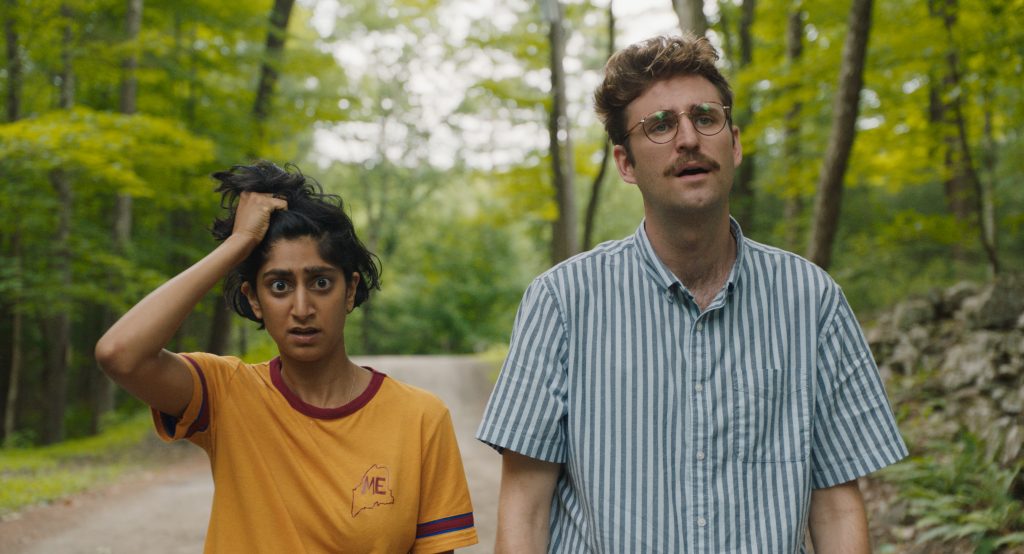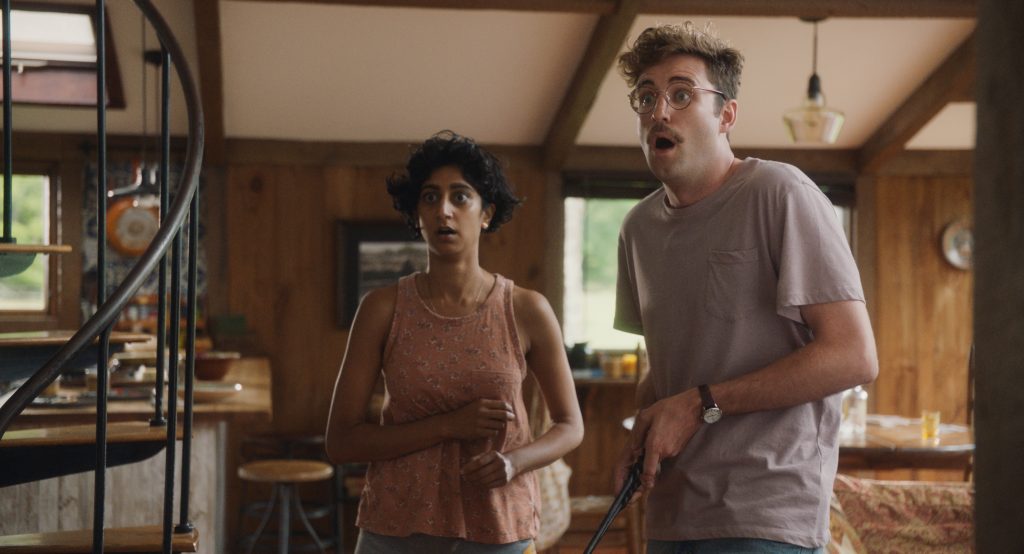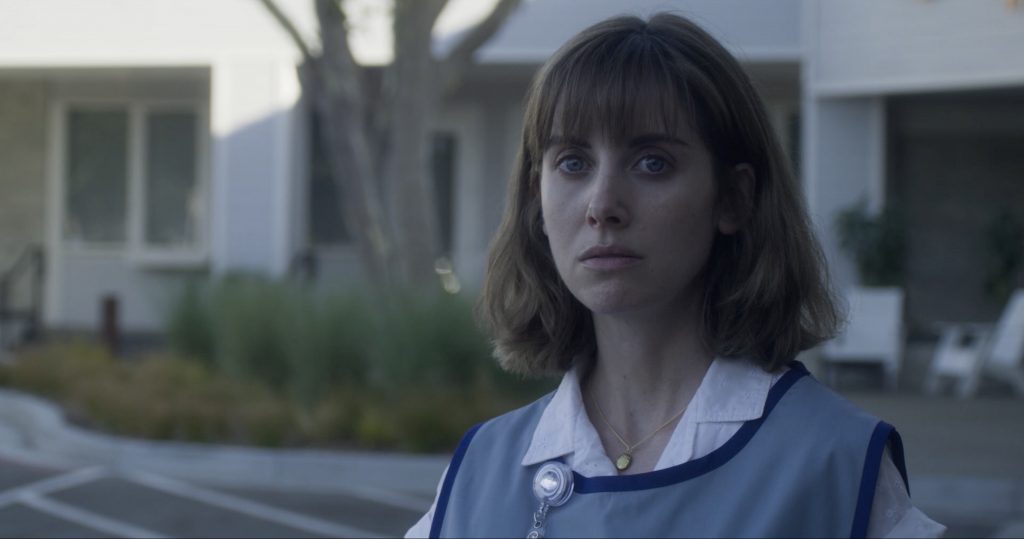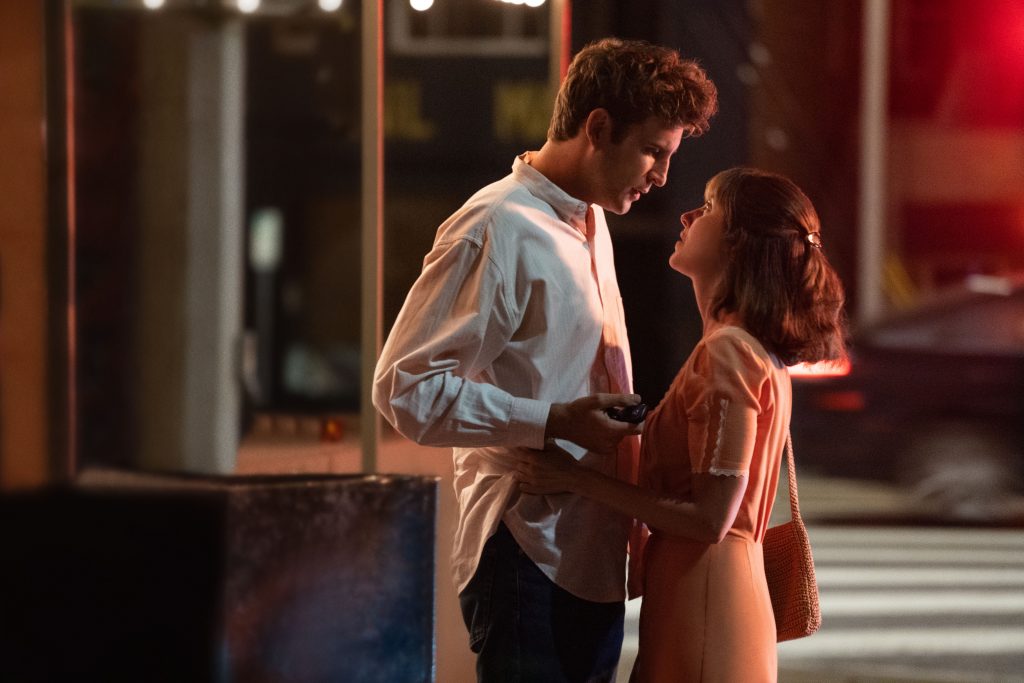October 2, 2020
by Carla Hay

Directed by Alex Huston Fischer and Eleanor Wilson
Culture Representation: Taking place primarily in New York City and Crawford, New York’s Pine Bush area, the sci-fi horror comedy “Save Yourselves!” features a predominantly white cast (with a few people of Indian heritage and one African American) representing the middle-class.
Culture Clash: During a getaway trip in a remote area, a hipster couple in their 30s find out that the world is being invaded by strange, fuzzy alien creatures.
Culture Audience: “Save Yourselves!” will appeal primarily who like quirky comedies that poke fun at “hipster culture” and people’s addictions to technology.

What’s scarier: Going a week without plugging into any technology or having strange, fuzzy creatures suddenly invade the world? The live-in couple at the center of the sci-f-/horror comedy “Save Yourselves!” find out when they go on a getaway trip to a remote cabin to “unplug” from technology, only to discover that the world is being invaded by creatures from outer space. The offbeat humor works for most of the movie, even though the story might end too abruptly for many people’s tastes.
Written and directed by real-life couple Alex Huston Fischer and Eleanor Wilson, “Save Yourselves!” shines best when it realistically portrays the everyday ebbs and flows of a relatively happy couple’s relationship, even when they’re in the midst of some absurd chaos. Su (played by Sunita Mani) and Jack (played by John Reynolds) live together in New York City’s Brooklyn borough, and they’ve reached a crossroads in their relationship.
Su, who is 30, is thinking about starting a family with Jack. Jack, who is 34, tells Su that he’s not ready to become a parent yet because he often still feels like a kid himself. They both work in technology-related jobs and look and act like “hipsters”—young people who want to be socially conscious and trendy at the same time. They are also very connected to technology, since they’re constantly on their phones and they use tech devices like Alexa and Siri.
It’s not made clear in the movie how long Su and Jack have been dating each other, but Su wants to take their relationship to the next level by becoming parents. During an argument over this issue, Su yells at Jack, “My mom had three kids by the time she was my age! You’re 34. What are you doing?” It’s the kind of cutting remark that she seems to regret almost immediately as she says it.
Su is the person in the relationship who wants more order, stability and a planned-out way of doing things. Jack is more of a “go with the flow” type of person who is doesn’t get as upset as Su does if things don’t go according to plan. In the movie’s opening scene, Su and Jack have a minor squabble because Jack and used her laptop and erased all the tabs that she had set on the laptop.
After some back-and-forth bickering, he admits that he deleted the tabs, but not intentionally. He tells Su, “In this world, there are so many things that are more important.” He then apologizes: “I’m sorry for all the things you want me apologize for.”
But that isn’t good enough for Su, who demands that Jack verbally list all of the things he need to apologize for until Su is satisfied with what he says. It’s pretty clear from this scene that Su has the more dominant personality in the relationship. She’s not mean-spirited. She would just rather have things done her way.
Later that evening, Su and Jack attend a bachelor party for their gay friend Blake (played by John Early), who is seen briefly in the movie. At the party, Jack talks with the bartender named Raph, pronounced “raff” (played by Ben Sinclair), who tells Jack that he used to be an investment banker, but he gave it all up to travel around the world and work in a less-stressful job.
Raph also gives John a rock crystal that Raph says he got from Patagonia. According to Raph, the rock will help ease anger and stress. Raph also mentions that he has a cabin in upstate New York (in the city of Crawford’s Pine Bush area) that he uses as a getaway. Raph invites Jack to use the cabin whenever he feels like it.
This conversation with Raph idea sparks an idea in Jack to go on a getaway trip with Su and completely unplug from technology for a week. He thinks it would be an ideal way to connect with each other on a deeper emotional level as a couple, since they won’t be distracted by technology and their jobs. Su is willing to try the idea when Jack mentions that Raph’s cabin in the woods would be the perfect place to stay during their trip.
Shortly after Su and Jack call their respective workplaces to let them know that they will be gone for a week, Su’s job sends her a message to let her know that she’s been fired. Apparently, taking that amount of time off from work on short notice was not acceptable to the company. After Su gets over her initial shock, she comments to Jack about getting fired: “This is a good thing.”
Later, after it sinks in how her job loss will affect her financial security, Su starts to worry, but she still decides to go ahead with the getaway trip. Su is in constant contact with her demanding mother, who calls Su frequently and is never seen in the movie. (Zenobia Shroff is the voice of Su’s mother over the phone.) Su dreads telling her mother that she lost her job, so she decides she won’t tell her mother until after Su gets back from the trip.
Before they take their road trip to the cabin, Su and Jack both change their outgoing voice mail greetings to tell callers that Su and Jack will be gone for a week (from June 2 to June 9) and they will be completely disconnected from technology and won’t be checking or returning messages for the entire week. Jack and Su bring their phones with them, in case of an emergency, but they make a promise to each other not to look at their phones during the trip.
When they arrive at the large modern cabin, Su and Jack see a brown shaggy fuzz ball that’s the size of a bowling ball on the kitchen floor. They don’t touch the fuzz ball, but they assume it’s some kind of kitschy decoration, and they call the sphere object a “poof.” (Not the British slang term for a gay man but the term that people use for a poof ball.)
Because the main reason for the trip is to work on their relationship, Su and Jack do some self-help, couples-therapy emotional exercises, where they ask each other questions that are supposed to elicit deep or intimate answers. Jack is initially annoyed when Su admits that she got some of these self-help instructions from the Internet before they left for the trip, because he thinks that defeats the purpose of it being a trip that’s truly free of technology. But Su placates him by saying that she wrote down the self-help instructions by hand instead of printing them out.
Su has a big secret during this trip: She can’t resist checking messages on her phone. She finds out that her mother has called multiple times to talk about creatures that have been sighted all over New York City. Her mother says that some people initially thought the creatures were rats but the creatures are actually something else. Su doesn’t think anything of the messages and doesn’t say anything to Jack about what she heard from her mother.
Soon after their arrival, Su and Jack notice something strange: A bottle of vodka and a jar of alcohol in the kitchen that were full the night before are now empty, with a sticky substance on the outside of the containers. Su and Jack both know that they didn’t empty the containers. Who or what did empty those containers?
Su and Jack soon find out that the “poof” that they thought was harmless is one of several creatures from outer space that have invaded the world. The creatures consume ethanol, which explains the missing liquor. And these creatures attack by secreting a long, red umbilical cord-like appendage that can attach itself to objects and strangle or subdue people.
Jack and Su (who eventually tells Jack that she’s secretly checked messages on her phone) then try to find out what’s going on and attempt to escape from their environment when they find more “poofs” on the property. There are several mishaps (hint: gasoline contains ethanol) and some other desperate fleeing people whom Jack and Su encounter along the way.
“Save Yourselves!” takes some unexpected and wonderfully weird twists. It’s not a typical sci-fi movie because many of the scenarios are so original and because the movie blends so many other genres in the story, such as comedy, horror and even a little bit of drama. Viewers who dislike all things “hipster” should know that Su and Jack are not as annoying as you think they would be. Except for things such as they live in Brooklyn and they think a crystal rock is a cool gift, Su and Jack are very much like a lot of yuppie couples in romantic comedies.
Because the majority of the screen time shows Su and Jack alone together, Mani and Reynolds carry this movie with a lot of authentic charm. Their chemistry as a couple is very believable. Even in Jack and Su’s quiet moments together before the alien invasion (such as reading their phones on a sofa together or spending time in the kitchen together) look very naturalistic and ring very true. In this movie’s very small-numbered cast, Mani stands out with her wonderfully expressive face that conveys all the emotions that Su is feeling, while Reynolds shows a lot of talent in the scenes that involved slapstick comedy.
The madcap parts of the movie, when Su and Jack are trying to escape from the deadly aliens, are obviously meant to be funny. But “Save Yourselves!” also incorporates elements of tragicomedy very effectively. There’s a scene where Jack and Su check their messages and react with a mixture of dread and guilt when they find out that New York City has been evacuated and they were unaware how much their loved ones were in danger while Jack and Su had been relaxing at the cabin. (The voice of Jack’s mother is played by Amy Sedaris.)
“Save Yourselves!” starts out as a couple trying to survive their relationship and end up just trying to survive. A lot of strange and unexpected things happen along the way, but the story never gets so bizarre that most people can’t relate to it. Thanks to memorable performances by Mani and Reynolds, this movie is a ride worth taking as long as viewers don’t expect a conventional ending.
Bleecker Street released “Save Yourselves!” in select U.S. cinemas on October 2, 2020. The movie’s digital and VOD release date is October 6, 2020.


